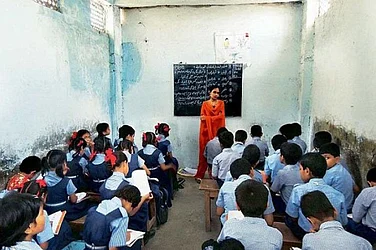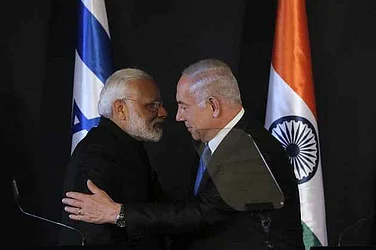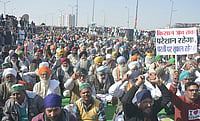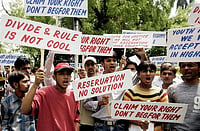Since Narendra Modi became the Prime Minister of India in 2014, the Opposition has constantly called for reverting to ballot papers for voting and discontinuing the use of electronic voting machines (EVMs). From hacking of EVMs to tampering in other ways, the Opposition has made and supported a range of allegations on EVMs.
Such calls have often come after the elections which Modi's Bharatiya Janata Party (BJP) won. Bahujan Samaj Party (BSP) supremo Mayawati was among the first to question EVMs after the BJP won the 2017 Uttar Pradesh assembly elections. Most recently, West Bengal Chief Minister and Trinamool Congress (TMC) supremo Mamata Banerjee has alleged that the BJP is hacking EVMs for the 2024 general elections.
When BJP questioned EVMs and Left supported it
Ironically, it was the Bharatiya Janata Party (BJP) that first questioned the EVMs in 2009 and CPI-M supported its position.
In 2009, Lal Krishna Advani, then the tallest leader of the BJP, questioned the EVMs. He, however, did not dispute the 2009 Lok Sabha election results and did not accuse the government of overt wrongdoing like the Opposition is doing for the past few years.
"We should revert to ballot papers unless the Election Commission is able to ensure that Electronic Voting Machines (EVMs) are foolproof and every possibility of their malfunctioning is taken care of," said Advani to The Indian Express in 2009.
The focus of Advani, however, was on the possible "malfunctioning" of EVMS, not any overt wrongdoing.
"Advani stressed that no one was raising any questions like rigging or malpractices in the elections, but larger questions about the possibility of EVMs malfunctioning must be addressed," reported The Express at the time.
Advani's received support from the Communist Party of India-Marxist (CPI-M), Anna Dravida Munnetra Kazhagam, Rashtriya Janata Dal (RJD), and Janata Dal-Secular (JD-S), reported PTI at the time.
The questions on the EVMs had come after a statement from former Delhi Chief Secretary Omesh Saigal's statement that rigging of EVMs was very much possible.
Opposition's allegations on EVMs after 2014 polls
After the 2014 general elections, the Opposition consistently campaigned against EVMs over claims of hacking and manipulation. These allegations remain unsubstantiated and several claims have been proved to be false.
Here we list the instances when Opposition leaders questioned the EVMs over the years:
2017: UP assembly elections
After the BJP stormed to power in Uttar Pradesh in 2017, former UP CM and BSP supremo Mayawati raised questions at the EVMs.
Mayawati said something must be wrong with the EVMs as the BJP got votes even in Muslim-majority areas. Muslims and Dalits have been key electoral blocs of BSP.
"State [UP] and Uttarakhand election results are very surprising. No one can digest them...From the results being shown, it is clearly felt that the voting machines have not accepted votes for any party other than the BJP or votes for other parties have also been transferred to the BJP. As per reports received by the party, and reports received by me, most of the votes even in Muslim-majority areas have gone to the BJP. This adds more weight to the belief that voting machines have definitely been managed," said Mayawati in Hindi at the time.
2017: Aam Aadmi Party and EVMs
Delhi CM and Aam Aadmi Party (AAP) convenor Arvind Kejriwal blamed electoral setbacks in assembly elections in Punjab and Goa and the municipal elections in Delhi on EVMs.
That year, AAP MLA Saurabh Bharadwaj also 'demonstrated' the 'tampering' of EVMs in the Delhi assembly. However, the machine used was not an EVM as all the EVMs are with the Election Commission of India (ECI). In its 'demonstration', AAP claimed the machine could be tampered with within 90 seconds by replacing the device's motherboard and inserting a "secret code". The ECI junked the allegations.
“Give us access to the warehouse where the EVMs for Gujarat polls are kept. We need just three hours to change all motherboards and hack the machines. I challenge that once the secret code is introduced, you (BJP) will not win a single booth in the state," The Times of India quoted Bharadwaj as saying at the time.
2019: The London press conference
The most sensational claims were made in 2019 at a press conference in London. The event was attended by Kapil Sibal.
In the presser, Syed Shuja, a self-proclaimed cyber-expert, claimed that the 2014 general election was 'hacked' by the BJP and his associates were killed in a guesthouse in Hyderabad. He further claimed that BJP leader Gopinath Munde, who died in a car accident in June 2014, knew the truth and was therefore killed. Independent fact-checks disproved the claims.
Newslaundry reported that there was no guesthouse in the area mentioned by Shuja in Hyderabad and that his professional credentials were also false. Shuja also claimed that the 2014 Kishanbagh riots were a cover for these killings and his family's house was also burnt in the violence and his parents were killed in the attack. Newslaundry reported there is no record at all of the parents' death in the violence that just lasted a day.
Shuja also claimed that Reliance Jio helped the BJP win the 2014 general elections. But Jio was not even formed at the time.
As for the claims of 'hacking' made by Shuja, white hat hacker and IT expert Ajit Hatti told Newslaundry that the claims of hacking from a "military-grade frequency modulator" were "absurd".
"EVMs have no wireless interfaces so you can’t do anything without physically accessing the EVM. There is no known way to tamper data using any kind of transponder whatsoever in the absence of wireless interfaces or through interference. An electronic device can be stalled using electromagnetic impulse, but you can’t craft and alter selective data, i.e. vote counts, in favour of any party," said Hatti.
On Shuja's claim that his team stopped EVM hacking in the 2015 Delhi elections by intercepting pro-BJP transmissions, Hatti told Newslaundry, "The person is talking of hacking EVMs through a wireless interface which doesn’t exist, through a technique which is unheard of and unverified, and by exploiting an unknown vulnerability which is even remotely and hypothetically not possible.
“Even if an attack on nationwide EVMs is possible and can be done by an established telecom Jio, then to intercept those attacks, you need access to similar telecom-like infrastructure which an individual or a team cannot have at their disposal without state or corporation’s support," he said.
Mismatch between votes polled and votes counted?
In the 2019 general elections, a report said there was of mismatch in the data published by the Election Commission of India (ECI) as votes polled and votes counted did not match in several constituencies.
"Of the 373 constituencies polled in the first four phases, there were surplus votes counted in over 220 of them – in the rest, vote deficits were recorded...According to an EVM expert, there shouldn’t be a mismatch of even a single vote and if a mismatch surfaces, the EC officer on counting duty should immediately flag it to his seniors," reported The Quint on May 31, 2019.
The Quint also reported that similar discrepancies were also recorded in the 2018 Madhya Pradesh assembly elections. Outlook cannot independently confirm this reporting related to the 2019 general elections and 2018 MP elections.
"The Quint has earlier reported on a similar mismatch in the Madhya Pradesh Assembly Elections held in November 2018. Out of 230 Assembly constituencies, the data of number of votes polled and number of votes counted did not tally in 204," said the report.
The ECI did not provide any response or explanation for the discrepancies, according to The Quint.
A petition filed by the Association for Democratic Reforms (ADR) is pending in the Supreme Court on a related matter. The petition flagged a mismatch between votes polled and votes verified through voter-verifiable paper audit trails (VVPATs) during the 2019 general elections, as per a report in The Leaflet on July 18.
The report further said the SC has directed the ECI to respond to the ADR's petition.
"The petition asserts that there is a complete vacuum in the law and the ECI has failed to provide a procedure to verify that a voter’s vote has been counted as recorded, which is an indispensable part of voter verifiability...The petitioner thus requests the Supreme Court to direct the ECI to ensure that the voters are able to verify through VVPATs that their vote has been counted as recorded," reported The Leaflet.


























